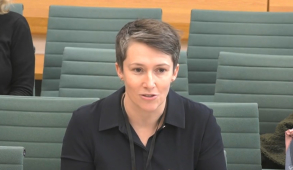Rules and delays reduce value of discharge funding
The £500m adult social care discharge fund was announced in September, with £300m channelled through integrated care boards and £200m through local authorities. All the funds were expected to be pooled in the better care fund and delivered in two tranches in December and January. This has been followed up with a further £200m additional hospital discharge fund to support short term placements up to the end of March.
Both funds come with rules on how they can be used and detailed reporting requirements. In fact integrated care boards (ICBs) will have to report daily on use of the new £200m fund in a new sitrep announced this week.
Giving evidence to the Health and Social Care’s inquiry into the autonomy and accountability of ICSs, Ms Walter (pictured) said the current difficulties were not a surprise. ‘We’ve all known that this winter is going to be very difficult and, as an organisation, we’ve been calling for government support in anticipation of a very difficult winter since the summer.’
She highlighted the delay in releasing money, even after the fund was announced in the autumn, and described the rules around spending as ‘incredibly rigid’. ‘And we’ve seen the same with the additional funding that was announced last week,‘ she said.
‘Not to say that this funding isn’t welcome,’ she told the committee, ‘But it feels like it is too little too late and these small slivers of funds come out with a very rigid set of expectations of how they need to be used, which may be different to what ICSs would want to use them for.’
The restrictions did not always allow for creative use of the funds, different models of delivery or working alongside voluntary sector partners. ‘The constraints mean that [systems] are not able to do that and it doesn’t create the maximum bang for your buck because of the way those funds are delivered, the rules that are set around them and the reporting requirements that go alongside them, which are incredibly onerous,’ she added.
The ’too little, too late’ criticism was also levelled at the funding arrangements by the Association of Directors of Adult Social Service last November.
The House of Lords Public Services Committee this week published a report on emergency healthcare (see our Top story) in which it echoed many of the criticisms around the short-term nature of the response and the lateness of the funding release.
‘The government has stated that the discharge fund can be used “to boost general adult social care workforce capacity through staff recruitment and retention”, but little information is available about how new staff, including agency staff, recruited using that funding will be paid once the discharge fund ends, which suggests that progress may falter after that time,’ the committee’s report said.
Related content
The Institute’s annual costing conference provides the NHS with the latest developments and guidance in NHS costing.
The value masterclass shares examples of organisations and systems that have pursued a value-driven approach and the results they have achieved.